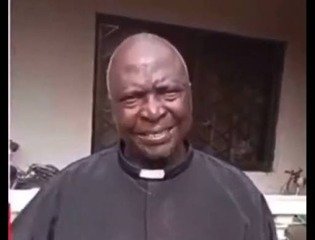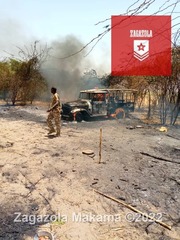Analysing the New Video Emerges Allegedly Featuring Boko Haram Fighters, Sparking Uncertainty
By: Zagazola Makama
A recently released video, approximately 5 minutes and 34 seconds in length, has surfaced online, allegedly showcasing three fighters from the JAS (Jama’at Ahl as-Sunnah lid-Da’wah wa’l-Jihad). The footage, set against the group’s signature curtained backdrop to obscure the location, presents a message that raises questions about its authenticity.
In the video, the central speaker begins with a recitation in Arabic before switching to English to convey the group's message. He begins by praising past JAS leaders, including Mohammed Yusuf, Abubakar Shekau, and the current leader, Abu Umaima, also known as Bakura Doro. The message is aimed directly at key figures in the Nigerian government, including the President, Vice President, and Senate President.
The speaker questions the religious credibility of the President, claiming that JAS al-Qaeda represents the true practice of Islam. He accuses the country's imams of wrongdoing and issues a warning to the government about the promotion of LGBTQ practices. Furthermore, he curses the current leadership and calls for the implementation of what he describes as “real democracy” aligned with Islamic principles. He also urges the public to protest against the government and demand the removal of the current regime.
Zagazola Makama who analyzed the video, noted its relatively high-quality production, particularly the edited opening and closing segments. However, questions have been raised about the video's credibility. The use of English, along with the speaker’s tone, appears inconsistent with previous Boko Haram or JAS propaganda videos. Additionally, the message focused heavily on LGBTQ issues and democratic reforms—topics that are not typically central to the group’s ideology.
While the video purports to be from JAS, there is no definitive evidence to confirm this claim. Analysts suggest several possibilities: the video could be the work of individuals impersonating JAS members to express dissatisfaction with the government, or it could feature individuals indoctrinated by the group but not part of its core leadership. It is also possible that those featured belong to non-Kanuri, Hausa, Fulani, or Buduma ethnic groups, which JAS leader Abu Umaima is known to co-opt if they pledge allegiance to him.
The incoherent nature of the message and the group’s apparent lack of seriousness lead to doubts about the video’s impact. However, if it resonates with certain audiences, it could encourage the release of similar videos aimed at heightening tensions.
Zagazola also stress the importance of close monitoring of such releases to verify their authenticity and assess potential threats.This development calls for caution as the group or imitators may aim to spread fear and disrupt stability through media channels.






























